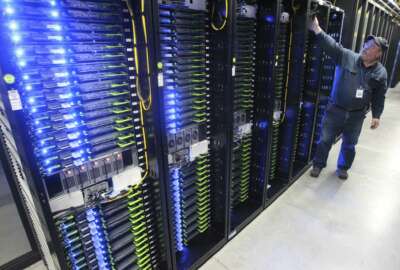
Energy Dept. supercomputer to study vets’ genomes
The Energy Department is lending some supercomputing capacity to the VA for a genetic coding and analysis program that could change how post-traumatic stress...
The Energy Department is lending some of its vast supercomputing capacity to the Veterans Affairs Department for an ambitious genetic coding and analysis program that could change the way post-traumatic stress disorder and other combat injuries are treated.
“The VA has what’s called the MVP program, that’s Million Veteran Program,” Morgan Luttrell, senior adviser of veterans relations at the Energy Department, said on Energy Department Month. “And right now they’ve enrolled close to 600,000 candidates, using their medical records. Like I’ve said before, processing that data is incomprehensible for a particular person, so here’s the partnership.”
The program collects blood samples for genetic analysis, and is on track to reach its goal of 1 million samples by 2020. That sheer amount of data, which Luttrell estimated at petabyte levels, actually makes it the biggest healthcare database in the world.
What is primarily stored for analysis is a genotype, which is basic, surface-level information, and can take tens of megabytes to store. But sometimes the program analyzes entire DNA sequences, which are much bigger and more data intensive. Each component of the DNA has to be read 30 to 40 times, analyzed in small fragments, and then realigned. That can take around 200 gigabytes to store.
“With that much information, you really can’t hand it off to one particular individual,” Luttrell told the Federal Drive with Tom Temin. “You absolutely need a super-computing capability to process all those analytics, and that’s where the marriage between the VA and DoE came together on such a great cause and idea.”
The VA is currently collaborating with Oak Ridge National Laboratory, home of the Titan Cray supercomputer, on this process. But the time-intensive part is not the calculations themselves, but preparing the data to be analyzed. First, it has to be de-identified.
“Security and safety of the medical records themselves is our primary focus,” Luttrell said. “We don’t want anything negative, we don’t want to shed any negative light or have anything happen in this process, because this will change healthcare, and the world, if you will, if our theories are correct. So we’re really taking a painstaking process to make sure it’s done correctly, and we’re not going to rush it.”
Luttrell said researchers are hoping to identify specific genetic makeups that might be more susceptible to suicidal tendencies, PTSD and traumatic brain injuries.
Other areas of research, which generally remains veteran-oriented, include:
- Gulf War illness;
- Schizophrenia
- Bipolar disease
- Substance abuse
- Cardiovascular/cardiometabolic disease
- Kidney disease
- Age-related eye disease
“What we want to know, in theory, what we want to find out is, is there actually a genetic code that is more receptive to not only pharmaceuticals, but to certain treatments, and will a certain individual contract a certain disease or post-traumatic stress just because of their genetic makeup? That’s what we’re hoping these data analytics are going to show us,” Luttrell said.
Copyright © 2025 Federal News Network. All rights reserved. This website is not intended for users located within the European Economic Area.
Daisy Thornton is Federal News Network’s digital managing editor. In addition to her editing responsibilities, she covers federal management, workforce and technology issues. She is also the commentary editor; email her your letters to the editor and pitches for contributed bylines.
Follow @dthorntonWFED
Related Stories





